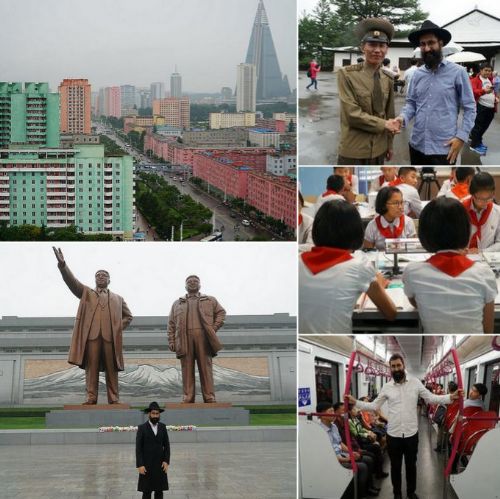A Lubavitcher Entered North Korea
Photographer Meir Alfasi dared to visit isolated North Korea and despite constant surveillance, he found common ground with them.
By COLlive reporter
He has visited 80 countries, put on Tefillin on the jungles of South America and printed editions of Tanya on the Everest Mountain and in Antarctica.
Now, Meir Alfasi seems to have topped himself and even made history again.
The 33-year-old Lubavitcher photographer and father of 4 children has visited the isolated North Korea, the infamous East Asian country ruled by Kim Jong-un.
The trigger to the audacious trip was the groundbreaking summit of the Korean dictator with US President Donald Trump.
“I said, I’ll be the first Lubavitcher there,” Alfasi told Ynet. “I first presented myself in the documents as a teacher, because journalists aren’t allowed to visit – they are considered the greatest enemies.”
Alfasi even provided them with the phone number of schools to verify his teaching status. “But then my contact person told me I wasn’t approved because my photos were posted on an English news website and they found it.”
Alfasi ended up admitting that he is also a photographer. Nevertheless, he was granted entrance and was signed on a document that “if I give a bad name to the country I would have to pay a fine” and that he cannot bring any camera equipment or post photos on social media.
“I came to China, got a visa to the North, and from there I boarded a rickety Russian plane to Pyongyang,” he said. North Korean tennis players on the flight and the Westerners wouldn’t talk to him.
During the flight was when he began doubting his decision. “I had already begun calculating that I’d rather die on the plane and not somewhere in North Korea while being tortured…”
Despite the explicit instruction, Alfasi arrived with no fewer than three professional cameras, including a Go-Pro. He also came with a Tallis, Tefillin, a siddur and a few cards about the Seven Noahide Laws.
At one point, border control brought a hammer to try to break open his black Tefillin boxes. His translators had lied, saying that the boxes don’t contain any prayer and are not associated with religion.
Alfasi visited the national monuments with the statues of the country’s leaders. He was instructed to purchase flowers as a sign of honor, not to put his hands in his pockets, or take a selfie. He was also told to bow.
Instead, he began reciting the Aleinu prayer and bowed at the words praising Hashem. “I forgot that my hands were behind my back and I got hit by my tour guides,” he said.
The next morning, Alfasi says his guide asked why he was talking to himself in his hotel room. “Until that point, I had no idea that they were listening to me the whole time,” he said. “I was never allowed to walk alone or make contact with anyone else.”
He says North Korea is the greatest “show” in the world. “Their museums are beautiful, the people are dressed beautifully and there are impressive buildings in the streets, but it’s all a facade, he says, noting the hungry children he also saw on side roads.
Despite the fear, Alfasi did not hide his Chassidic or Israeli identity, walking proudly with a black fedora and a kapota at times. “Every place that I mentioned Israel, I was welcomed with open arms,” he said.
He also found similarities between the locals and the frum Jewish community. “They get married through a shidduch – through a matchmaker or a relative. The girls at the ages of 24-28 and the boys between 28-32. And they don’t live together before marriage.”
Alfasi proudly noted that “Coca Cola does not exist in North Korea but Chabad has already been there.”
